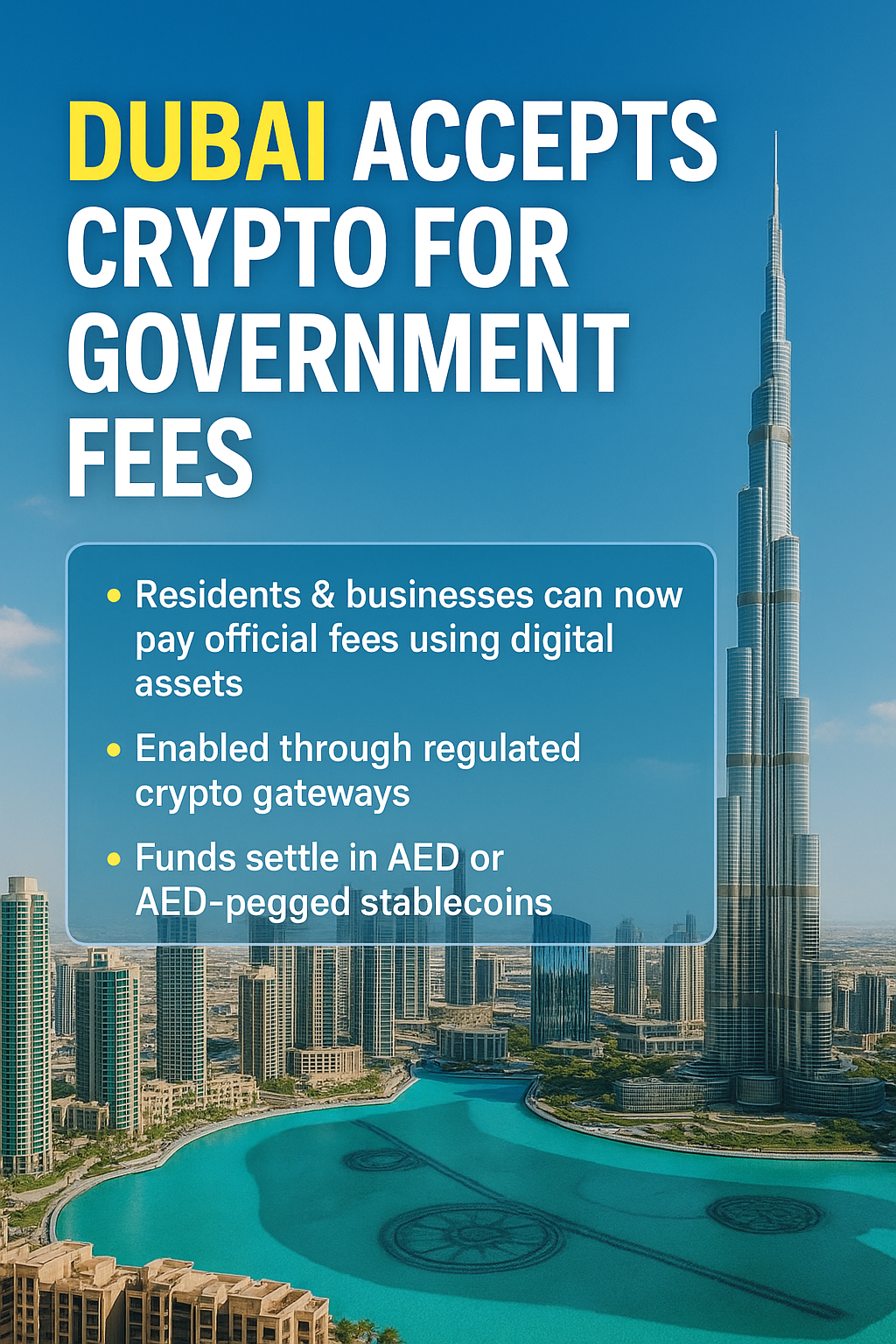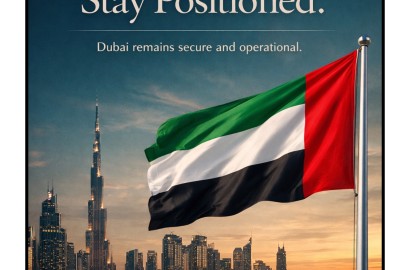If you’re an investor looking at Dubai property, you’ve just got one more reason to pay attention. The Dubai government has announced a major new step in its digital-asset journey: accepting cryptocurrency payments for government fees and levies. This is more than a headline—it signals a shift in how digital assets integrate with real-estate and investment flows in Dubai.
Here’s what you need to know, why it matters for real-estate, and how you can position yourself ahead of the curve.
What’s Happening?
• The emirate’s government (via its finance and digital-asset arms) has entered into partnership with Crypto.com, granting in-principle approval for residents and businesses to pay government fees in digital assets or stablecoins, with conversion to dirhams at settlement. 
• Reports state that the government will receive funds in AED or dirham-pegged stablecoins, making the payment process crypto-enabled but fiat-settled at the government side.

• While some media headlines may suggest it’s “tax payments in Bitcoin”, what is clearly confirmed so far is “government fees, levies and charges” – which strongly hints at the pathway to full tax-payment acceptance. 
• The regulatory backdrop: The Virtual Assets Regulatory Authority (VARA) regulates virtual assets in Dubai, and legislation is already in place for crypto payment frameworks. 
Why This Really Matters for Real-Estate Investors
1. Global investor flexibility: Crypto-asset holders (Bitcoin, Ethereum, major stablecoins) now have an additional channel to interact with the Dubai market. Less friction between global money flows and local investment.
2. Signal of innovation & legitimacy: When a government enables crypto payments, it signals investor-friendly infrastructure, trust in digital assets, and readiness to shorten cross-border transaction chains.
3. Real-estate utility convergence: Dubai is already one of the most active markets for crypto-to-property transactions (developers accepting Bitcoin/ETH etc). This move ties government services into the same digital asset ecosystem, increasing infrastructure efficiency.
4. Marketing advantage: For real-estate professionals positioning themselves as “digital-asset friendly”, this becomes a compelling point to attract crypto-wealth clients who may want to invest in Dubai property but hold crypto.
5. Potential tax / regulatory benefits: Dubai offers a zero personal income tax and zero capital gains tax regime for crypto holdings of individuals.  The crypto-payments-accepted government piece enhances the environment for crypto-enabled investors.
Table: What this change means & how to think about it
• Volatility remains a factor if crypto is held d
—
Aspect | Current Position | What the Crypto Payments Move Changes | Implication for You as Investor |
Payment medium for government fees | Traditional AED bank transfers, cheques, cards | Crypto-asset wallets + conversion via licensed platform → AED/dirham-stablecoin settlement | Easier settlement for global crypto holders, smoother onboarding for offshore investors |
Regulatory clarity | Crypto companies need licences; business payments still evolving | Government participation sets precedent, infrastructure builds faster | Less regulatory uncertainty for crypto-to-real-estate deals |
Real-estate investor appeal | Dubai already allows crypto payments for some properties | Government fees and payments become crypto-compatible – increasing ecosystem strength | Use as leverage when selling off-market listings: “We cater to crypto holders” |
Marketing & positioning | Many stand-alone crypto-friendly offerings in real-estate | A unified story: from government → developers → property transaction in one crypto-friendly jurisdiction | Branding opportunity: “Dubai’s first-mover in crypto + property” |
Risk profile | Crypto regulation still emerging globally | Government integration reduces one dimension of risk for crypto-real-estate interplay | More comfort for international investors who hold digital assets and want real-estate exposure |
•
Key Considerations (and Caution Points)
• This isn’t “pay your taxes in Bitcoin tomorrow” in the broadest sense (yet). The language so far is about “government fees and charges” through crypto platforms. It’s a major step, but full tax payment in crypto may have more regulatory steps.
• Volatility remains a factor if crypto is held directly — however, the platform described converts into AED or stablecoins, which reduces the volatility risk at settlement. 
• AML, KYC and licensing requirements remain in force. For real-estate investors/transactors with crypto, ensure the gateway/platform is fully compliant under VARA and local law. 
• For property deals: Even if payment in crypto is accepted, underlying property registration, leases, titles will still follow local civil law and property-law protocols. Crypto payment simply handles the medium, not the legal structure of the real-estate asset.
• Tax residency matters: Some of the crypto-tax benefits apply for individuals resident in Dubai/UAE. Foreign investors should seek professional advice for how it applies in their home country. 
Why This is a Major Signal for High-Net-Worth Investors & Global Buyers
If you’re reading this as a real-estate investor or high-net-worth individual holding digital assets, here’s why it matters:
• Dubai is reinforcing its global capital-attraction strategy by lowering friction for asset flows (from crypto wallets into real estate).
• If you already hold crypto funds offshore, this means you may feel more comfortable deploying them into Dubai real-estate markets, because the jurisdiction is explicitly building the rails.
• Given your focus on off-market high-end properties and investor strategy (like our earlier discussions around Dubai Hills, Palm Jumeirah, Al Barari etc), you can leverage the “crypto-friendly” narrative as a value-add when pitching to international crypto-holders or digital-asset focused investors.
• The structural story: Dubai is more than just a luxury-real‐estate market; it’s aligning with the digital-asset infrastructure, which may appeal strongly to next-generation investors (born crypto, real-estate mind-set) rather than purely traditional property investors.
This is more than just tech-news. It’s a structural shift that can influence how real-estate, capital-flows, and digital assets interact in Dubai.
Want personalised guidance?
We’ve helped many of our clients with free consultation on how to deploy crypto assets into Dubai real-estate — and we’d be happy to do the same for you.
📱 WhatsApp +971 585 259 680
💌 Email: info@dubairealestateprincess.com
Let’s explore how you can tap this new era of crypto-enabled investment and secure access to off-market luxury listings in Dubai.
Related posts:
Regional tension has raised questions among residents and investors. Here’s a structured, calm assessment of Dubai’s stability and the practical safety measures every UAE resident should follow.
AI-powered relocation services are changing how global buyers, founders, and families land in Dubai, not just by “finding a home,” but by reducing uncertainty across visas, schooling, lifestyle mapping, and long-term property strategy. Used correctly, AI becomes a private decision...
Categories
- 🏡 Nad Al Sheba Living
- Business Bay / Downtown Dubai
- ⛳ Jumeirah Golf Estates Living
- 💧 District One Living
- 🌳 Dubai Hills Living
- 🌊 Palm Jumeirah Living
- Testimonials & Success Stories
- Community Events & Sustainability
- Eco-Luxury Lifestyle Blog
- Luxury Rental Market
- Dubai’s Green Communities
- Property Management & Sustainability
- Relocation to Dubai
- Off-Plan Developments
- Investment Opportunities
- 🌿 Al Barari Living
- Buyer Resources
- Dubai Real Estate Princess
- Off-Market Exclusives
- Eco-Luxury Properties
- Sustainable Investing
- Luxury Living in Dubai
- Sellers’ Guide
- Dubai Market Insights
- House architecture
- News


 UAE Tension and Dubai Stability: Safety Measures & Smart Investor Positioning
UAE Tension and Dubai Stability: Safety Measures & Smart Investor Positioning
 AI-Powered Relocation Services in Dubai Dubai relocation concierge, HNW relocation Dubai, Dubai property strategy, relocation risk checklist, private
AI-Powered Relocation Services in Dubai Dubai relocation concierge, HNW relocation Dubai, Dubai property strategy, relocation risk checklist, private
 Why It’s Profitable to Buy a Branded Dubai Residence or Penthouse in 2026
Why It’s Profitable to Buy a Branded Dubai Residence or Penthouse in 2026
 How Dubai Becoming the First Government to Accept Bitcoin & Crypto for Tax and Fee Payments Changes the Game for Real Estate Investors
How Dubai Becoming the First Government to Accept Bitcoin & Crypto for Tax and Fee Payments Changes the Game for Real Estate Investors
 🌿 The Cape at Al Barari: The Final Chapter of Dubai’s Most Iconic Nature Community (Full Investor Guide)
🌿 The Cape at Al Barari: The Final Chapter of Dubai’s Most Iconic Nature Community (Full Investor Guide)